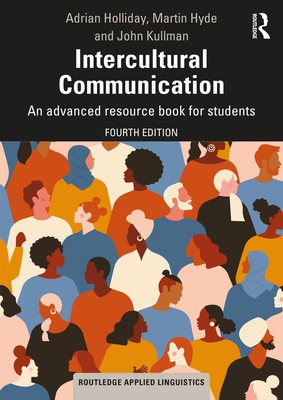
- We will send in 10–14 business days.
- Author: Adrian Holliday
- Publisher: Routledge
- ISBN-10: 0367482460
- ISBN-13: 9780367482466
- Format: 17.4 x 24.6 x 1.8 cm, minkšti viršeliai
- Language: English
- SAVE -10% with code: EXTRA
Reviews
Description
Intercultural Communication provides a critical introduction to the dynamic arena of communication across different cultural and social strata. Throughout this book, topics are revisited, extended, interwoven, and deconstructed, with the reader's understanding strengthened by tasks and follow-up questions.
The fourth edition of this popular textbook has been updated to feature:
■ new readings by Kwame Antony Appiah, Yoshitaka Miike, Edward Ademolu and Siobhan Warrington, Helena Liu, and Michael Zirulnik and Mark Orbe, which reflect the most recent developments in the field;
■ refreshed and expanded examples and tasks including new material on an Asiacentric approach to intercultural communication, selfies as a global discourse, the impact on intercultural communication of English as a lingua franca in multinational organisations, and representations of Africa in charity media campaigns;
■ extended discussions of topics including intercultural training, voluntourism, challenging essentialism in business contexts, and intersectional approaches to identity;
■ revised further reading suggestions.
Written by experienced teachers and researchers in the field, this fourth edition of Intercultural Communication is an essential textbook for advanced students studying this topic.
EXTRA 10 % discount with code: EXTRA
The promotion ends in 23d.03:04:58
The discount code is valid when purchasing from 10 €. Discounts do not stack.
- Author: Adrian Holliday
- Publisher: Routledge
- ISBN-10: 0367482460
- ISBN-13: 9780367482466
- Format: 17.4 x 24.6 x 1.8 cm, minkšti viršeliai
- Language: English English
Intercultural Communication provides a critical introduction to the dynamic arena of communication across different cultural and social strata. Throughout this book, topics are revisited, extended, interwoven, and deconstructed, with the reader's understanding strengthened by tasks and follow-up questions.
The fourth edition of this popular textbook has been updated to feature:
■ new readings by Kwame Antony Appiah, Yoshitaka Miike, Edward Ademolu and Siobhan Warrington, Helena Liu, and Michael Zirulnik and Mark Orbe, which reflect the most recent developments in the field;
■ refreshed and expanded examples and tasks including new material on an Asiacentric approach to intercultural communication, selfies as a global discourse, the impact on intercultural communication of English as a lingua franca in multinational organisations, and representations of Africa in charity media campaigns;
■ extended discussions of topics including intercultural training, voluntourism, challenging essentialism in business contexts, and intersectional approaches to identity;
■ revised further reading suggestions.
Written by experienced teachers and researchers in the field, this fourth edition of Intercultural Communication is an essential textbook for advanced students studying this topic.


Reviews